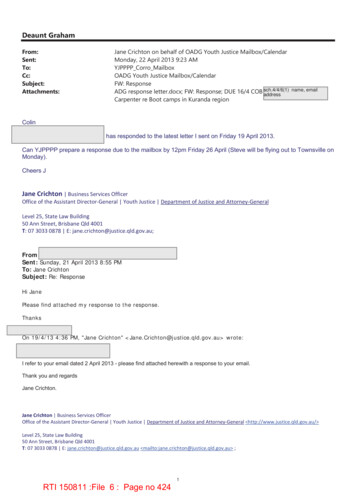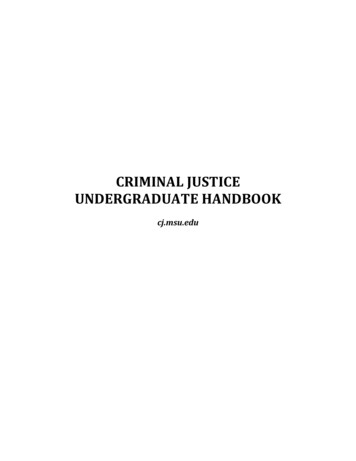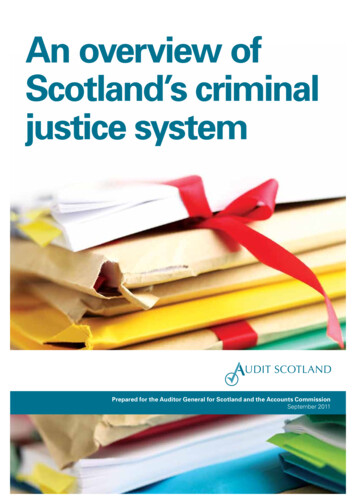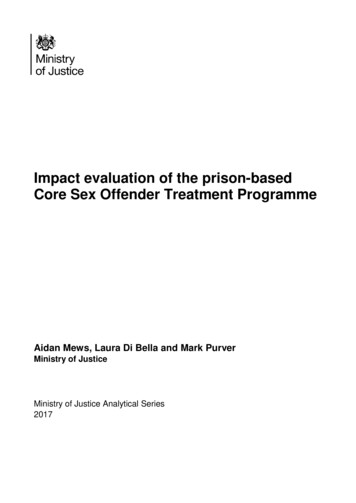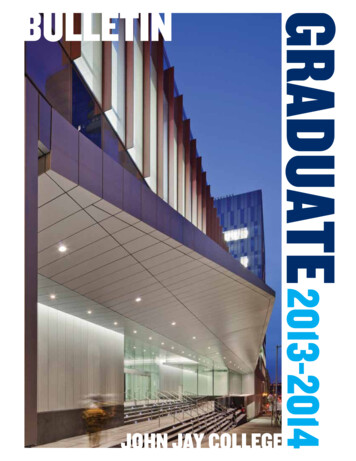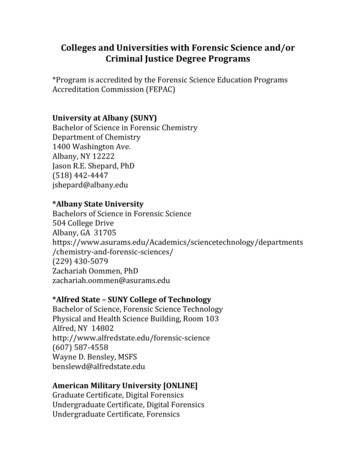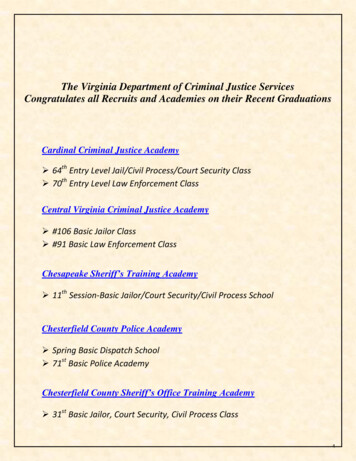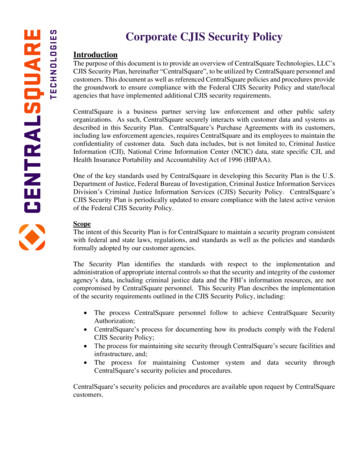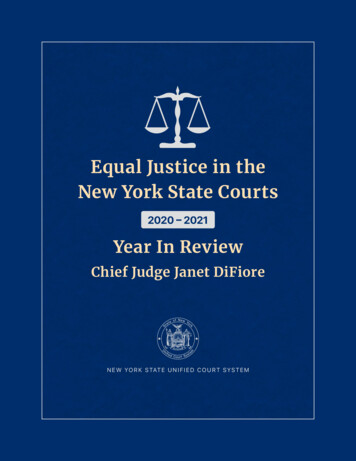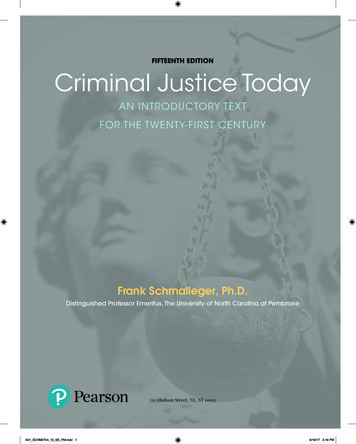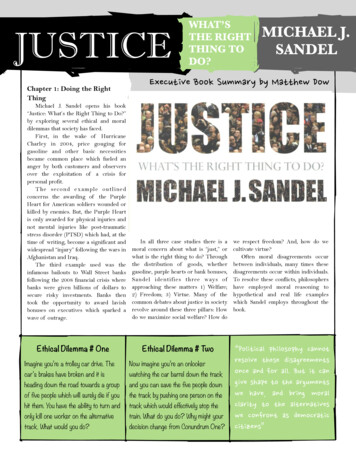
Transcription
JUSTICEChapter 1: Doing the RightThingMichael J. Sandel opens his book“Justice: What’s the Right Thing to Do?”by exploring several ethical and moraldilemmas that society has faced.First, in the wake of HurricaneCharley in 2004, price gouging forgasoline and other basic necessitiesbecame common place which fueled ananger by both customers and observersover the exploitation of a crisis forpersonal profit.The second e xample outlinedconcerns the awarding of the PurpleHeart for American soldiers wounded orkilled by enemies. But, the Purple Heartis only awarded for physical injuries andnot mental injuries like post-traumaticstress disorder (PTSD) which had, at thetime of writing, become a significant andwidespread “injury” following the wars inAfghanistan and Iraq.The third example used was theinfamous bailouts to Wall Street banksfollowing the 2008 financial crisis wherebanks were given billions of dollars tosecure risky investments. Banks thentook the opportunity to award lavishbonuses on executives which sparked awave of outrage.Ethical Dilemma # OneWHAT’STHE RIGHTTHING TODO?MICHAEL J.SANDELExecutive Book Summary by Matthew DowIn all three case studies there is amoral concern about what is “just,” orwhat is the right thing to do? Throughthe distribution of goods, whethergasoline, purple hearts or bank bonuses,Sandel identifies three ways ofapproaching these matters 1) Welfare;2) Freedom; 3) Virtue. Many of thecommon debates about justice in societyrevolve around these three pillars: Howdo we maximize social welfare? How doEthical Dilemma # TwoImagine you’re a trolley car drive. TheNow imagine you’re an onlookercar’s brakes have broken and it iswatching the car barrel down the trackheading down the road towards a groupand you can save the five people downof five people which will surely die if youthe track by pushing one person on thehit them. You have the ability to turn andtrack which would effectively stop theonly kill one worker on the alternativetrain. What do you do? Why might yourtrack. What would you do?decision change from Conundrum One?we respect freedom? And, how do wecultivate virtue?Often moral disagreements occurbetween individuals, many times thesedisagreements occur within individuals.To resolve these conflicts, philosophershave employed moral reasoning tohypothetical and real life exampleswhich Sandel employs throughout thebook.“Political philosophy cannot resolve these disagreements once and for all. But it can give shape to the arguments we have, and bring moral clarity to the alternatives we confront as democratic citizens”
ABOUT THEAUTHORName: Michael J. SandelBorn: 1953Institution: HarvardUniversityPolitical Philosophy:CommunitarianTeaches: Justice, Ethics inBio-Technology, PoliticalPhilosophyFree Lectures @justiceharvard.orgLives: Brookline,MassachusettsChapter 2: The GreatestHappiness Principle /UtilitarianismJeremy Bentham (1748-1832) is oftenattributed as the father of utilitarianism. Hisargument to justice is that the highestprincipal of morality is to maximize thegeneral welfare, the collective happiness, theoverall balance of pleasure over pain. This isalso known as “maximizing utility” whichapplies to both individuals and communities.This idea is now commonly referred to as the“greatest good for the greatest number”principal.To determine what is just is to decidewhich choice maximizes the utility of thecommunity by adding up all the benefits of aparticular choice and subtracting all thecosts. The right or “just” choice is the onethat maximizes the balance of happinessover suffering. This is commonly referred toas a cost-benefit analysis where the benefitsand costs are attributed a common value,typically a dollar value, which allows forgreater comparison.This perspective is has remained popular buthas two primary objections.I n d iv i d u a l R i g h t s : T h e u t i l i t a r i a nperspective fails to respect individual rightsby only paying attention to the sum ofcommunity satisfaction.Case: In ancient Rome, Christians werethrown into the colosseum for sport. Whilethe Christian suffered greatly, the Roman’scollective ecstasy could be so great that itwould could outweigh the utility costs of theChristians.Common Currency of Value: Is it possibleto translate all moral goods into a singlecurrency?Case: In the 1970’s, the Ford Pinto was proneto exploding when rear ended. Fordconducted a cost-benefit analysis andconcluded the costs to repair every vehicleoutweighed the costs to the loss of humanlife.“When moralreflection turnspolitical, when itasks what lawsshould govern ourcollective life, itneeds someengagement withthe tumult of thecity, with thearguments andincidents that roilthe public mind”
What is the cost of human life?Chapter 3: Do We OwnOurselves? / LibertarianismEconomic inequality has become anincreasing concern in the United Statesbut why is this perceived as wrongprovided that such inequality did notarise without force or fraud? One of theobjections to utilitarianism listed abovewas on the basis of individual freedoms.Libertarians hold individual rights to beabsolute and above any other moralcode. They favor free markets andminimal government regulations, not inthe name of economic efficiency orsocial welfare, but in the name ofhuman freedom.The libertarian idea rests on thebasis of self-ownership. I own myselfand my labour, and if I own my ownlabour, I am entitled to the fruits of mylabour. Taxing the rich to pay the poorviolates the rights of the rich. If myincome is taxed, I lose the ownership ofmy labour and thus, ownership tomyself.The primary objections tolibertarianism are as follows:Taxation is not slavery: If you aretaxed, you can choose to work less andpay lower taxes.Individual’s owe their success tothose who contribute towards it:Success and wealth is not achievedindependently and is a product of thesocial environment from which it rises.Individuals can vote on taxes: In andemocracy, individuals have a voice inmaking the tax laws to which they aresubject.Success is product of luck: Whilesome success can be attributed to hardwork, some success is also a product offavorable conditions and “natural gifts”that may be arbitrarily favored by acommunity.Beyond these objections, libertarianideals lend themselves to someparticularly troubling moral questions.For instance, should one be able toterminate their own life throughassisted suicide? Should a person be freeto sell a kidney? What about consensualcannibalism?Chapter 4: Hired Help /Markets and MoralsDo markets have morals? Is the freemarket fair? Are there some goods thatmoney can’t buy or shouldn’t buy? Ifso, what’s wrong with buying andselling these goods.The case for free markets rests ontwo claims. The first regards humanfreedom similar to the libertarianargument. The second is social welfarewhich is more similar to the utilitarianargument.For example, most Americans andC a n a d i a n s o p p o s e a n y fo r m o fconscription for a military based onlibertarian grounds, that the stateshould not coerce individuals into thearmed services. One could also make theargument that conscription woulddecrease the overall social welfare whencompared to a “volunteer army”. Eitherway, ranks of the armed forces in NorthAmerica are filled through the labourmarket, just like any other job.Sandel raises two objections tomarket in this case. First, how “free” arethe members of the armed forces. Theyby and large come from low incomebackgrounds. Does an individual from ahigh income background have the samefreedom than someone from a lowincome background? The secondobjection concerns the roles of civicvirtue and the common good. What isdifference between today’s professionalvolunteer army and mercenaries?Markets would argue nothing - they arebeing paid for a service in demand butmost people have an objection and feelthat armies should have some conceptloyalty. But if loyalty or civic duty isincluded in the equation, why notc o n s c r i p t s i n c e e v e r yo n e i n acommunity should have the same levelof civic obligation. This asks the largerquestion: What obligations beyond themarket do citizens of democracies oweto one another and how do suchobligations arise?“JUSTICE”BY THENUMBERSPages308Chapters10
Chapter 5: What Matters isMotives / Immanuel KantImmanuel Kant (1724 - 1804) wasa philosopher in East Prussia. Hisprimary works focused intensively onseveral questions: What is thesupreme principal of morality? Andwhat is human freedom?Kant’s answer to freedom is morestringent than most. He argues, thatwhen humans seek pleasure or avoidpain, we aren’t acting freely becausewe are acting as slaves to our appetitesand desires. To act freely is not tochoose the best means to a particularend; it is to choose the end itself, forits own sake. This is Kant’s centralphilosophical idea known as thecategorical imperative.According to Kant, morality isb a s e d o n a u n i v e r s a l l a w, acommandment of pure practicalreason from which all duties andobligations derive. When choosingactions, one may consider the ends thatare right, such as helping someone, andends which are “good” such as enrichingoneself. Kant believed the “right” to besuperior over the good and throughreason human’s can learn the “right”.One of Kant’s “rights” is to betruthful, not because it is good butbecause it is principled. But what if amurderer comes to your door to ask forSPOT THE DIFFERENCE?Black Water is a private mercenaryarmy used in the wars in Iraq andAfghanistan. They are paid to fight.The United States Army are paidprofessional soldiers. They are also paidto fight.your friend who is hiding in the house.Is it morally permissible to lie to themurderer? Kant would argue that itwould violate the categorical imperativeto tell the murderer that your friend isnot there; however, it would not violatethe categorical imperative if you said, “Isaw that person down the street twohours ago ” for the latter is not acomplete lie.Immanuel Kant (1724 - 1804)“Act only according to that maximwhereby you can at the same time willthat it should become a universal lawwithout contradiction.” - Kant
“The principles of justice are chosen behinda veil of ignorance” - John RawlsChapter 6: The Case forEquality / John RawlsMost citizens in a democraticcountry have never signed a contract butmuch of political philosophy regards thesocial contract, a social agreement tosurrender some rights and freedom inexchange for the protection of the restof your rights. But if I never consentedto this agreement, does it still apply?John Locke argued that consent is tacitlyprovided when anyone enjoys thebenefits of government. But how can ahypothetical agreement do the moralwork of real contract?John Rawls (1921 - 2002), anAmerican philosopher, argues that theway to think about justice is to thinkabout what principles a communitywould agree to during an initialsituation of equality.Imagine if society gathered tocollectively decide on which moralprincipals they want to govern the socialsocial - to write a social contract. Such atask would be exceptionally difficultsince many hold different political andreligious values while some are very richand powerful while others are very poorand politically marginalized. There is noway to know whether a finalarrangement would be “just” based onthese inequalities. But imagine, everyonein society was blinded by a vail ofignorance, that is, they don’t knowwhether they are rich or poor, powerfulor weak, female or male, strong or frail.What kind of contract would emergefrom this arrangement since no onewould have superior bargaining power?Rawls thinks that through this initialarrangement of equality, all rationalself-interested individuals would notchoose utilitarianism because they don’tknow if they are the Christians beingthrown to the lions. Nor would thechoose pure libertarian principalsbecause they could be poor or homelesswith no social safety net. Rawls believesthat two principals of justice wouldemerge. The first, basic liberties for allsuch as freedom of speech andassociation which would supersede socialutility or general welfare. The secondprincipal would be concern social andeconomic equality. Rawls does not thinkthere would need to be pure equality buta system that provides benefits to theleast well off. When the distribution ofwealth no longer improves the wellbeing of least well off person, redistribution should be reduced.Sandel concludes that Rawls haspresented the most compelling case for amore equal society in the history ofAmerican political philosophy.Chapter 7: Arguing AffirmativeActionAffirmative Action is among themost hotly contest topics incontemporary racial politics in America.The promotion of individuals frommarginalized communities inemployment and universities not basedon merit but on the color their skinchallenges the many of our core valuesregarding equality.Sandel argues that affirmative actionis based on two rationales. The first isto compensate for past wrongs andinjustice. It says that minority studentsshould get preference to remedy ahistory of racial discrimination whichhas placed them at a poor advantage.But if this is the case, shouldn’taffirmative action be based on class andnot race? The second rationale is thepromotion of diversity. It argues thataffirmative action is not a means toassist marginalized communities, but topursue diversity as a social good.Diversity allows for individuals to learnfrom one another and gain criticalcultural and intellectual perspectives.A brief submitted in a US SupremeCourt case over Harvard’s affirmativeaction policy states, “If scholarlyexcellence were the sole or evenpredominant criterion [for admission],Harvard College would lose a greatdeal of its vitality and intellectualexcellence [T]he quality of theeducational experience offered to allstudents would suffer” Objectors to thisrationale argue that affirmative action isunlikely to meet is goal and that suchpolicies will only invigorate a hostiler e s p o n s e t ow a r d s m a r g i n a l i z e dcommunities.The primary objection againstaffirmative action is based in libertarianprincipals since race based preferencesviolate the rights of other applicantswho are eligible but not chosen. RichardDworkin, a legal philosopher, addressedthis claim by asking what right has beenviolated. Perhaps a white student who isdenied admission to university believe itis there right not to be judged byfactors, such as race, which are beyondtheir control but as Dworkin rightlypoints out, most traditional criteria foruniversity admission involve factorsbeyond one’s control. For instance,being a lousy football player or a having
SPOT THE DIFFERENCESegregationist policies separatedstudents at American schools based onrace.T h i s c e r t a i n ly r a i s e s l a r g e rquestions about how universities definetheir missions since universities couldand have anti-Jew quotas or otherdiscriminatory policies but Sandelpoints out, affirmative action differsbecause it is not intended to insult orstigmatize anyone whereas anti-Jewquotas used race as a badge ofinferiority.Chapter 8: Who DeservesWhat? / AristotleAffirmative actions policies at universitiesselect students for admission based onrace.a poor ear for music may preventsomeone from gaining admission butthese are certainly beyond one’s control.Other’s would argue good footballplayers should be based solely on theiracademic merit but Dworkin points outthat universities define their missionsand subsequent admissions criteria onmany attributes and that no individualhas the right that the university definetheir criteria in a way that prizes aboveall, a particular attribute whetheracademic or athletic skill. Dworkin’score argument is that admission to auniversity is not an honor or a virtue, itis a way to contribute to the socialpurpose of the university. The missionof the university defines the relevantmerits, not the other way around.Greek philosopher Aristotle had twocentral ideas concerning justice. Thefirst, justice is teleological. To define“rights” requires us to figure out its telosor, the purpose, end or essential natureof the social practice in question.Second, justice is honorific whichmeans, to reason about the telos of apractice is, in part, to reason or argueabout what virtues it should honor andreward. He believed debates aboutjustice are really just debates abouthonor, virtue, and the nature of thegood life.For Aristotle, justice means givingpeople what they deserve but one mustargue: What are the merits thatdetermine what someone is due?Aristotle would argue that it dependson what is being distributed. Todetermine what is the just distributionis to inquire about the telos of the goodCASEY MARTIN’S GOLF CARTCasey martin was a professional golfer but suffered from abad leg that required he use a golf cart while on the course.Prior to joining the professional tour, he petitioned for theuse of golf cart, a request that was denied because it wouldgive Martin an unfair advantage. The case went to the USSupreme Court where it was decided that he should beable to use the cart. The court ruled that carts were notinconsistent with the fundamental character of the game.“The essence of the game has been about shot making-using clubsto cause the ball to progress from the teeing ground to a holesome distance away with as few strokes as possible.”Do you agree with the Supreme Court decision or doesMartin’s golf cart give him an unfair advantage?
being distributed. Since, according toAristotle, every distribution of justicediscriminates so we must determine whatdiscriminations are just?For instance, suppose a community isdistributing pianos, who get’s the bestpiano? Aristotle would argue that the bestpiano players should get the best pianosbecause the purpose of pianos is to createbeautiful music and the best pianosplayers can make the most beautifulmusic. To distribute pianos on any othergrounds, such as nobility, wealth, orstrength, would be unjust. Returning toaffirmative action in universities, todetermine what is “just” is to determinethe telos of the university, a topic whichremains contested.In the realm of politics, Aristotleargues the telos of politics is the pursuitof the good life, therefore, the people whoshould hold the highest offices and honorsshould be those who are greatest atidentifying the common good. Throughlaws and social norms, communities cancultivate the good life and good character.However, Kant and Rawls reject this wayof thinking for it leaves little room forfreedom. For instance, a constitution thattries affirm a particular conception of the“good life” risks imposing on some of thevalues of others.Aristotle (384 - 322 BC)“Making amends for my country’spast wrongs is one way of affirmingmy allegiance to it”Chapter 9: What Do We OweOne Another / Dilemmas ofLoyaltyDo the ancestors of slave owningAmericans owe an apology to theancestors of African American slaves?Surely an injustice took place but can acurrent generation make an apology forpast wrongs of a previous generation? Ifyes, should they? Former Prime Ministerof Australia John Howard, whendiscussing the issue in the context of thetreatment of Australia’s aboriginalpopulation stated, “I don’t not believe thatthe current generation of Australiansshould formally apologize and acceptresponsibility for the deeds of an earliergeneration.” This debate intensifies withthe discussions of reparations.The principled objection to theseapologies outlined by Howard is that weare responsible for our own actions andnot the actions of others. This is alsoknown as the moral individualism, but isthere room for collective responsibility?Rawls would answer no based on thetwo liberal conceptions of obligations.The first are natural duties that areuniversal, obligations we owe one anotheras rational beings. They include theobligations to respect others, to do justice,avoid cruelty etc. The second arevoluntary obligations that we incur byconsent. They could include theobligation to paint your house if I havebeen paid to do so. But do we haveobligations beyond these two?Sandel would argue yes, we have anobligation of solidarity to those whom weshare a certain history. The moral weightof this obligation is derived from the“situated aspects of moral reflection, froma recognition that my life story isimplicated in the stories of others.” Theseobligations manifest themselves infamilies, communities and religiousorganizations.The objection to the obligation ofsolidarity is that this special obligation isreally just collective selfishness, or a“prejudice for own kind.” Sandel respondsand argues that obligations of solidarityare both inwards and outward and thatmany of the special responsibilities flowbetween particular communities who havea morally burdened history, like thehistory between the ancestors of slaveowners and the ancestors of slaves.Collective apologies are primar yexamples of the way solidarity can createmoral responsibilities for communitiesbeyond than the ones that we belong to.Chapter 10: Justice and theCommon GoodSandel concludes the book challengingby liberal conceptions of neutrality inpursuit of the “the good life”. He argues,“the attempt to detach argument aboutjustice and rights from arguments aboutthe good life is mistaken for two reasons:First, it is not always possible to decidequestions of justice and rights withoutresolving substantive moral questions;and second, even where it’s possible, itmay not be desirable.” Take for instance,the abortion and stem cell debates. Thereis no space for neutrality within the state,abortion is either provided, often on thebases of freedom of choice, or it is not.Either sides case cannot be made withouttaking on the moral and religiouscontroversy about when human life starts.Justice, Sandel argues, is inescapablyjudgmental. Whether discussing PurpleHearts or bank bailouts, abortion orconscription, questions of justice arelinked with competing notions of honorand virtue, pride and recognition. Justicemust be understood beyond what is theright way to distribute things, it is alsoabout the right way to value things.Sandel concludes with four possiblethemes for the “new politics of thecommon good”, which he hoped at the
“A politics of moral engagement is not only a moreinspiring ideal than a politics of avoidance. It is alsoa more promising basis for a just society.”time of writing, were being broughtout through Barack Obama’s 2008presidential campaign.Citizenship, Sacrifice and Service: “Ifa just society requires a strong sense ofcommunity, it must find a way tocultivate in citizens a concern for thewhole, a dedication to the commongood.”The Moral Limits of Markets:“Markets are useful instruments fororganizing productive activity. Butunless we want to let the marketrewrite the norms that govern socialinstitutions, we need a public debateabout the moral limits of markets”Inequality, solidarity and CivicVirtue: The gap between the rich andthe poor undermines the solidarity thatdemocratic citizenship requires.“Our Gross National Product now is over 800 billion dollars a year. But that Gross NationalProduct counts air pollution and cigarette advertises, and ambulances to clear our highways ofcarnage. It counts special locks for our doors and the jails for the people who break them. Itcounts the destruction of the redwood and the loss of our natural wonder in chaotic sprawl. Itcounts napalm and counts nuclear warheads and armored cars for police to fight the riots in ourcities. It counts.television programs which glorify violence in order to sell toys to our children.Yet the Gross National Product does not allow for the health of our children, the quality ofThe Politics of Moral Engagement:“.we need a more robust and engagedcivic life than the one to which we’vebecome accustomed.A more robustpublic engagement with our moraldisagreements could provide stronger,not a weaker basis for mutual respect”REVIEWtheir education or the joy of their play. It does not include the beauty of our poetry or thestrength of our marriages, the intelligence of our public debate or the integrity of our publicofficials. It measures neither our wit nor our courage, neither our wisdom nor our learning,neither our compassion nor our devotion to our country. It measures everything, in short, exceptthat which makes life worthwhile. And it can tell us everything about America except why weare proud to be Americans.” - Robert F. Kennedy, 1968by Matthew DowMichael J. Sandel has been able to capture and present the most important ideas inpolitical philosophy with tremendous clarity. His presentation reflects that best of academicpopulism by tackling some of the most complex and controversial moral issues, andbreaking them down, not by party or partisan lines, but through the theoretical traditionsthat remain the foundations or our current political arrangements. His defense of the“politics of the common good” is unequivocal and he provides readers with a clear pathforward. All voters, politicians, bureaucrats and citizens would do well to read this bookand be forced to rethink their assumptions of civic and political life. Sandel asks us all for amore just way of doing politics, are we up to the Inspiring91%Informative97%
For instance, should one be able to terminate their own life through assisted suicide? Should a person be free to sell a kidney? What about consensual cannibalism? Chapter 4: Hired Help / Markets and Morals Do markets have morals? Is the free market fair? Are t
